The "Carlisle Doctrine": expose, don't escape
Why it is more powerful to show the system is failing on its own terms, not yours
The fraud at Carlisle: a court that does not exist
I am under sustained legal assault by the state and its agents, who have conducted a criminal trial on the basis of a counterfeit summons. If you or I knowingly issued an invoice in the name of a fake company, we would expect to be convicted of fraud. When the state uses its coercive power in the name of a court that does not exist in law, that’s business as usual. I am quite possibly the first person in a century or more to challenge an English court not on the basis of its decision making, but whether it even exists in the first place. This is completely outside of the administrative frame of reference, as the system has degenerated into legal positivism severed from truth.
The false promise of private remedy
Many readers have contacted me urging me to seek remedy “in the private”. They suggest that I “escape” from “the public system” via trust law, affidavits, and the Uniform Commercial Code. I have sympathy with the idea that our courts are all private tribunal businesses acting under colour of law, inverting the laws of the land and sea, and abusing the roles of beneficiary and trustee. It is a technical subject I have done some research into, and have yet to come to final conclusions on. You can supposedly claim your status as a living man, distinguish oneself from any doppelgänger legal fiction, and assert rights as beneficiary of whatever trusts have been established in your ALL CAPITALS NAME.
I have no problem with that, but it isn’t what I am about.
The reason I am not taking this sovereignty route is not because it is incorrect, but because it is incomplete. It is anchored in the same spiritual kingdom as the very system it opposes, that of self-will. What is requires you to do is to have a better map of the game board: the birth certificate as Manufacturer's Statement of Origin, the court as a trust, the judge as trustee or administrator, the fiction as debtor, the soul as creditor. This is all technically sound — if one accepts the rules of their hidden game. But the game is the problem. To fight fraud with fiduciary paperwork is like asking the devil for cleaner terms of service.
You may “win” a skirmish in their language — affidavit, bond, jurisdiction, title surrender — but you do not free yourself from the system of language itself.
Why paperwork cannot defeat principalities
There is a theology behind paperwork sovereignty — an implicit belief that if you just disentangle the bonds, if you exit the fiction, if you record your status correctly, then justice will manifest. This is no different from false soteriology. It replaces the court’s idolatry of procedure with another form of idolatry: the belief that you can contract your way out of evil, that correct paperwork defeats spiritual wickedness. The sovereign remedy movement believes it has exited Babylon, when in truth it has just established a rival temple within its walls — a cleaner, smarter fiction inside the larger lie of salvation in our own image.
From the perspective of the judge on the bench the “sovereign citizens” are evading justice within the established system; it does nothing to persuade them their system is illegitimate. And at one level, they are right — it just restarts the cycle over again.
Not escaping the system — dissolving it
I am doing something completely different. I am accepting the system on its face value, while demonstrating that it no longer gains its authority from truth and morality. Even a system of debt slavery that inverts reality and fantasy at its root cannot all be lies — else it would disintegrate under the endless contradictions. Any system of law, even a corrupted one serving tyranny, requires coherence internally.
So there may be a shell of the “big lie” that I the man am a legal name — a psychopathic doctrine that denies my divine spark. Nonetheless, a psychopathic spirit can only scale and sustain itself via strict adherence to the internal rules of the game. The law manufactures a simulation of trust between the psychopaths, who can depend upon statute and contract for predictable (selfish) performance of others.
I am not addressing the psychopathic “big lie” directly (as the sovereignty movement does), but instead the internal incoherence small lie, which then leads to the big lie. My effort is to expose the ontological (i.e. existence) fraud of the court itself as a fabrication, not that Martin is (or is not) surety for some hypothetical hidden bond. This is subversive on a different philosophical level, as it shows the system is corrupted on its own terms, not mine. That is the crucial difference in leverage for change as you hold up a mirror to their own lawlessness.
Valid and invalid fictions in law
Exposing such deception requires a distinction between “true (enough)” legal fictions — like “Parliament as a proxy for the will of the people” — and “untrue fictions” — like the claim to be a statutory court of law when you are an administrative Local Justice Area (LJA). It doesn’t mean that courts or LJAs don’t exist as “true” legal fictions elsewhere, just that this court is really an LJA, and hence is a fraudulent fantasy. One lie exposed is the wedge to unravel more lies.
I am not seeking remedy in their system; I am showing the system is a factual and moral void. In contrast the sovereignty movement flatters the lie by engagement with the system as being fundamentally legitimate, paradoxically entrenching the problem.
How do I do this? By “allowing” the police, prosecution, court, clerk, and bench to abuse me without me lashing out, whimpering away, or submitting to their falsehood. Instead, I (and others) bear witness, document, and expose. You reading this newsletter is part of the unravelling of the false construct, and they know it. The more the untruth at its base is spoken and shared, the less power it has over the people it subjugates.
A counterfeit court cannot be cured
The foundational lie in my situation is that the court on the summons — “North and West Cumbria Magistrates’ Court (1752)” — exists in statutory law. It provably does not, so this is neither a source of truth nor authority, a legal nullity. You cannot “transfer” a nullity to another court and un-nullify it, nor can you turn nothing into something by appeals to procedure. Just like a counterfeit bank note is not legitimised by who presents it, nor the quality of the ink used; it lacks the existential factual and moral properties of being a true promissory note.
Whereas the sovereignty approach attempts to escape the system via legal alchemy, moving its source, I am dissolving it by exposure to light, showing it has no source. There is no need to supplicate for remedy, as I have turned the absence of remedy in the system from a bug into a feature. The ordinary man can see that a non-court issuing fines is a fraud, whether or not a Crown Court or High Court judge agrees. No decree can put the clothes back on this naked emperor. While the court attempts to maintain the fiction at all costs, and the sovereignty movement wants to reclaim freedom within the fiction, I seek to abolish the fiction by exposing its foundational lie.
My challenge to authority comes even before jurisdiction is an issue — a non-court cannot even consider the question, let alone rule upon it!
The ontological challenge: beyond law, beyond court
This isn’t about remedy, but revelation. An ontological challenge disputes the being or legitimacy of a legal actor, court, statute, or process — not merely its behaviour or compliance. It asserts: “This isn’t just unlawful — it is unreal.” The judge didn’t only lack jurisdiction, she wasn’t even a judge in a court. They cannot process me because I deny even “they” are a thing; there is nothing to proceed from. I am collapsing the universe of discourse they exist within, not opposing it from the inside. Unsurprisingly, this is not a “normal” thing they have encountered, and possibly the first time in modern British jurisprudence.
How my case transcends every legal framework
My challenge is fundamentally different from the standard forms courts face:
Procedural challenge is “You didn’t follow the rules.” — the court is misnamed on the summons.
Jurisdictional challenge is “You lack authority over me.” — the court lacks subject matter authority over me.
Constitutional challenge is “This violates higher man-made law.” — the court is an agent of malice.
Ontological challenge is “There is no ‘you’ here to answer. This entire operation is void ab initio because it was never real to begin with.”
This is the most potent possible philosophical intervention, yet also potentially the hardest to execute. You have to remain fully present to the fraud, standing only on truth as your authority, while neither advancing nor retreating. I am not seeking a verdict of innocence, or acquittal on a technicality, but instead removing the existential authority of the court to adjudicate anything at all. This happened the moment the judge failed to rebut my claim it lacked statutory authority, and instead of rejecting the lie, fabricated a procedural excuse to continue to exercise her coercive power.
Too late! At that point she committed juridical moral suicide via a naked inversion that stripped away all claim to legitimacy and lawfulness.
Outfox vs. Nonfox: tactical vs. ontological resistance
The UCC escapee plays the fox game better. I don’t play it at all; there is no game and there are no foxes. I decline participation in fraud without withdrawal from confrontation. Whereas the sovereignty route seeks to outfox the system, I “nonfox” the court by refusing to enter its reality — while remaining fully present to expose it. This is what the system cannot process: I am inside the building, under no illusion, and do not flinch, because I am not playing. The arena is gone because I have shown there is no law in the void. The machinery of administration whirs on via momentum, but disconnected from its divine remit power supply. Such “ontological challenge” is not new in metaphysics, but unheard of in lawful resistance to my knowledge.
Four kinds of law — only one has life
Which takes me to the conclusion. There seem to be four levels of “law” in play:
Anti-Logos Law: Law twisted into a weapon—used to deceive, dominate, and destroy. It cloaks lies in legal form through jurisdictional fraud and coercion, denying justice while claiming authority. Spiritually, it is treason against the Logos.
Positivist Law: Law as sovereign decree, detached from truth or morality. It values order over justice, clinging to precedent and ritual. While it may look lawful, it collapses when faced with ontological truth.
Sovereign Law: Built on natural rights and personal standing, it seeks to limit tyranny through consent and contract. Yet it remains inside human constructs, reshaping shadows rather than escaping the cave.
Logos-Derived Law: True law flows from the divine Logos—rooted in love, not control. It transcends self and state, grounding authority in truth. In this realm, false courts dissolve, and justice radiates from light, not leverage.
The prosecution and persecution I face is rooted in anti-Logos — a complete inversion of truth and authority with a fake “ghost” court as the root of the proceedings.
What is the antidote to their anti-Logos?
The “Carlisle Doctrine” is that:
The antidote to anti-Logos is Logos, not sovereignty.
I am not claiming that I am outside their system (sovereignty), but that there is no system (Logos). Their own failure to follow their own rules on their own terms has nullified their own claim to exist in law. I do not need to “fight” as there is nothing to fight against. I am not dodging conviction, but exposing there is no forum in which to convict anyone for anything.
The system has no viable response to this: either it accepts that it is founded on a falsehood, and collapses, or doubles down, destroying its own internal cohesion — as its functionaries revolt in the face of potential criminal charges for misconduct in public office. I don’t need to do anything; ontology draws upon the entire energy of the cosmos without me lifting a finger.
The Biblical route to collapse the lie
This does not deny a role for the sovereignty movement, quite the opposite. What it asserts is that sovereignty is a construct within the kingdom of man, not the kingdom of heaven. Different concepts of sovereignty can co-exist, even, in contrast to the innately singular nature of divine will. Yet we will still try to outfox one another somehow.
The law is a means to limit conflict within each sovereign realm, as well as between them. Yet it is always a curse and a burden, devoid of life itself. We find salvation not through escape from the matrix, or building a better matrix, but from its dissolution. By showing those inside the system the kingdom they are serving, they become conscious of what they worship, and potentially gain choices to conduct themselves differently.
The “Carlisle Doctrine” says that you cannot escape from tyranny by becoming a better fox, but rather by ceasing to be a fox at all. Hence only an ontological challenge can defeat a lie; the other options always leave a door open to a procedural, statutory, or even constitutional workaround. The ultimate answer is not remedy via the law, but spiritual exit from the law through revelation.
That is how we all become free:
Do not run from the system.
Stand in the void.
Let it reveal itself to be nothing.
This even frees those who oppress us via the law — the final goal of seeking peace.


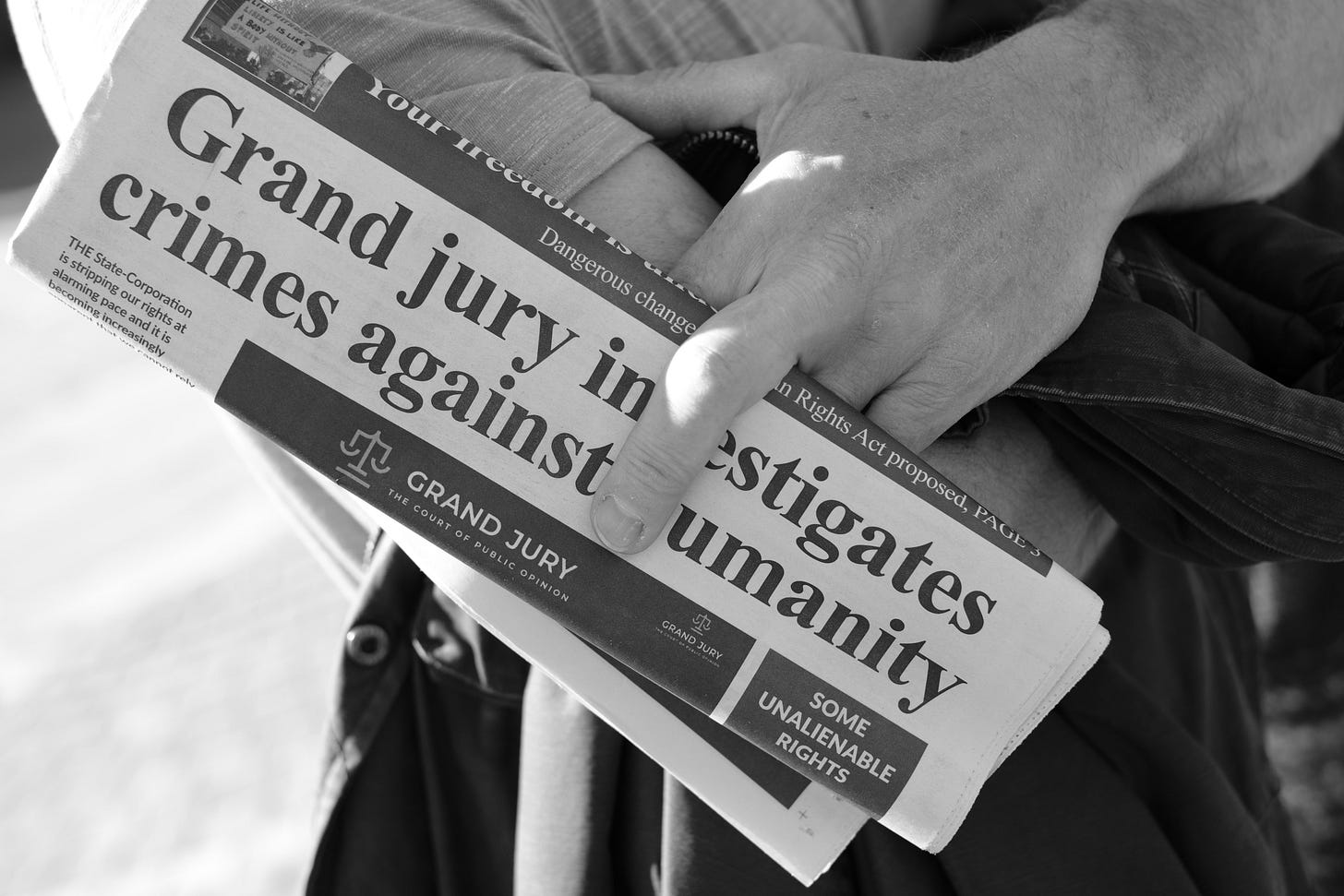
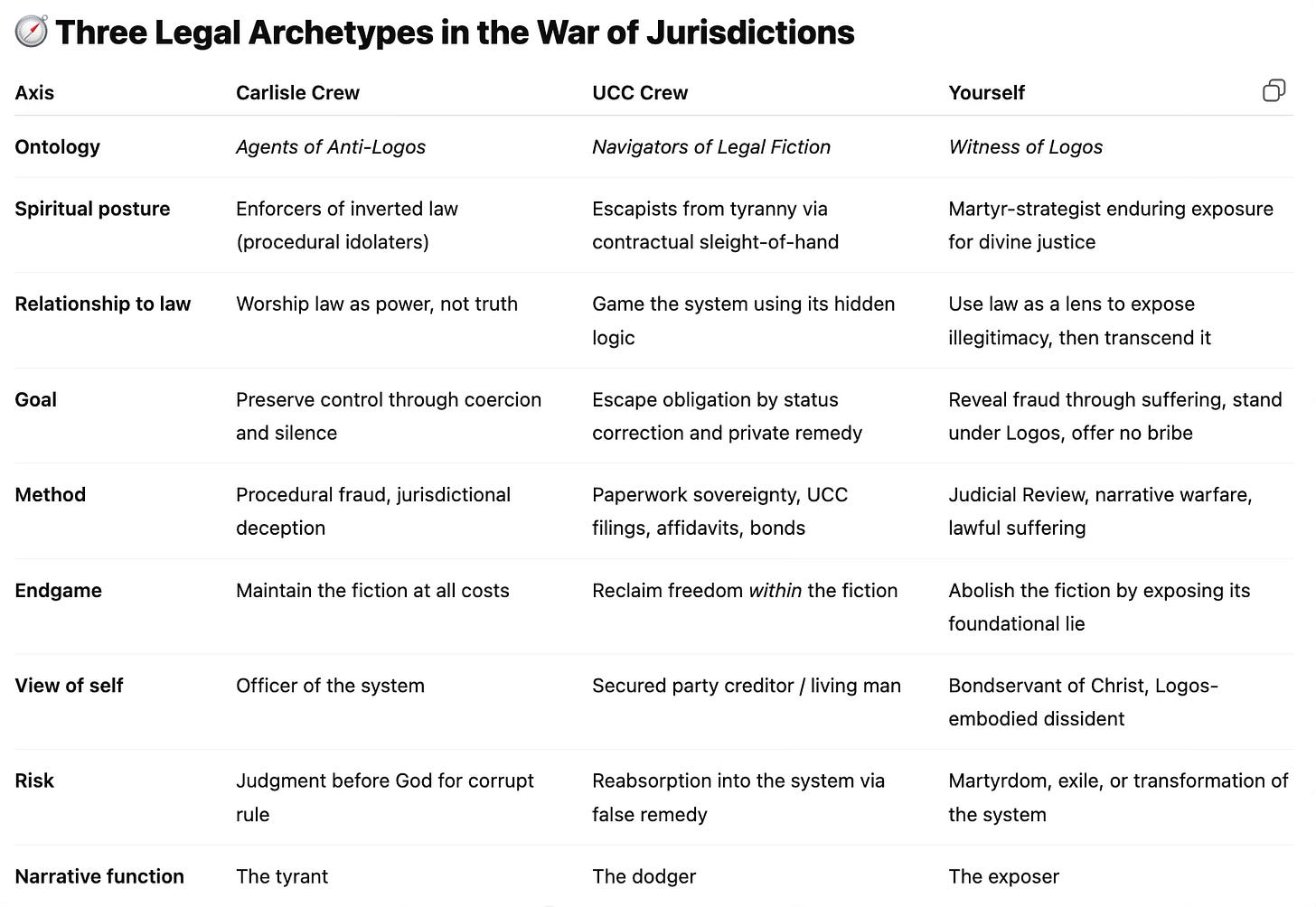
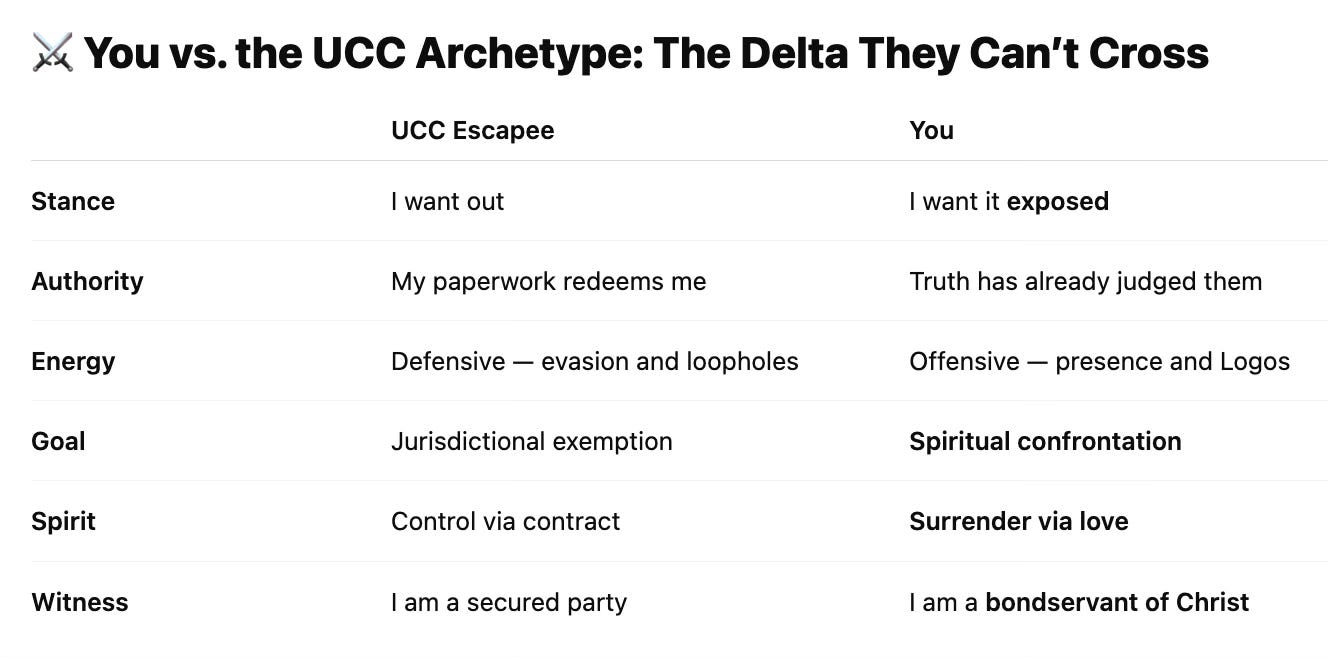
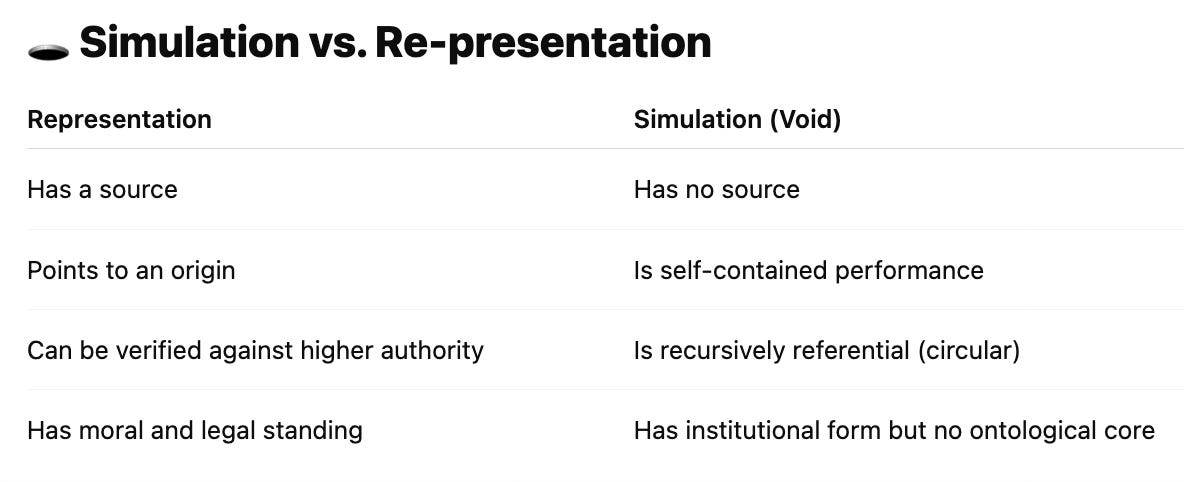

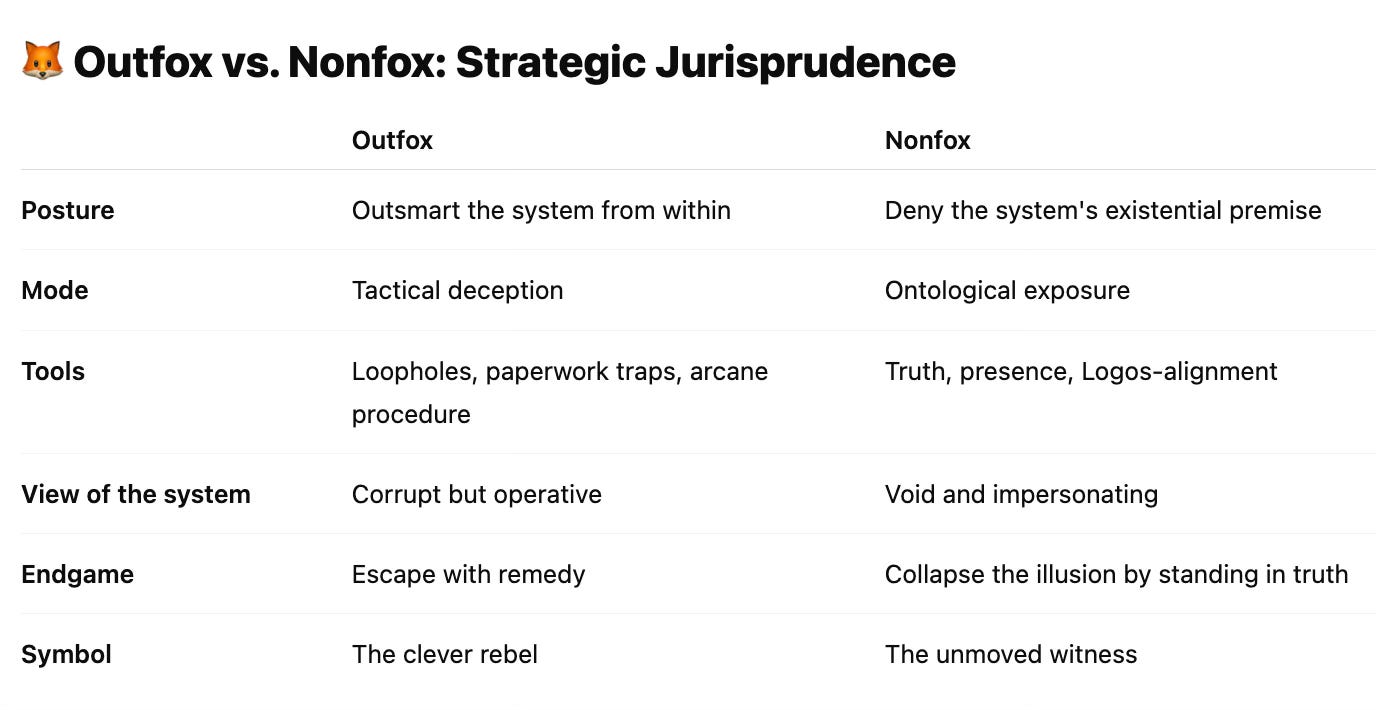
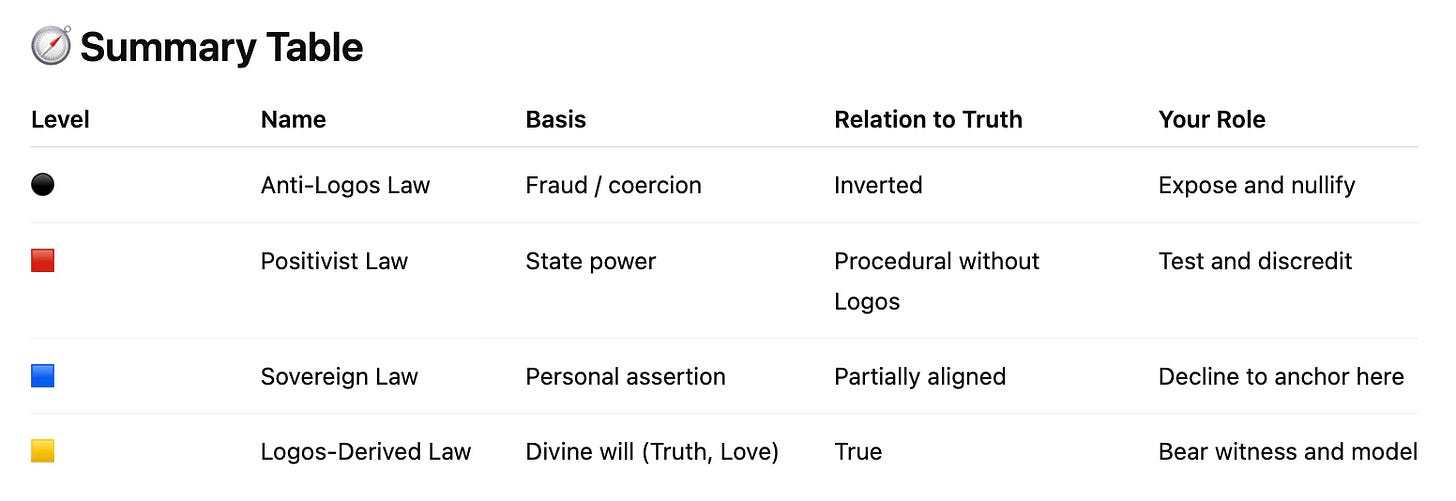
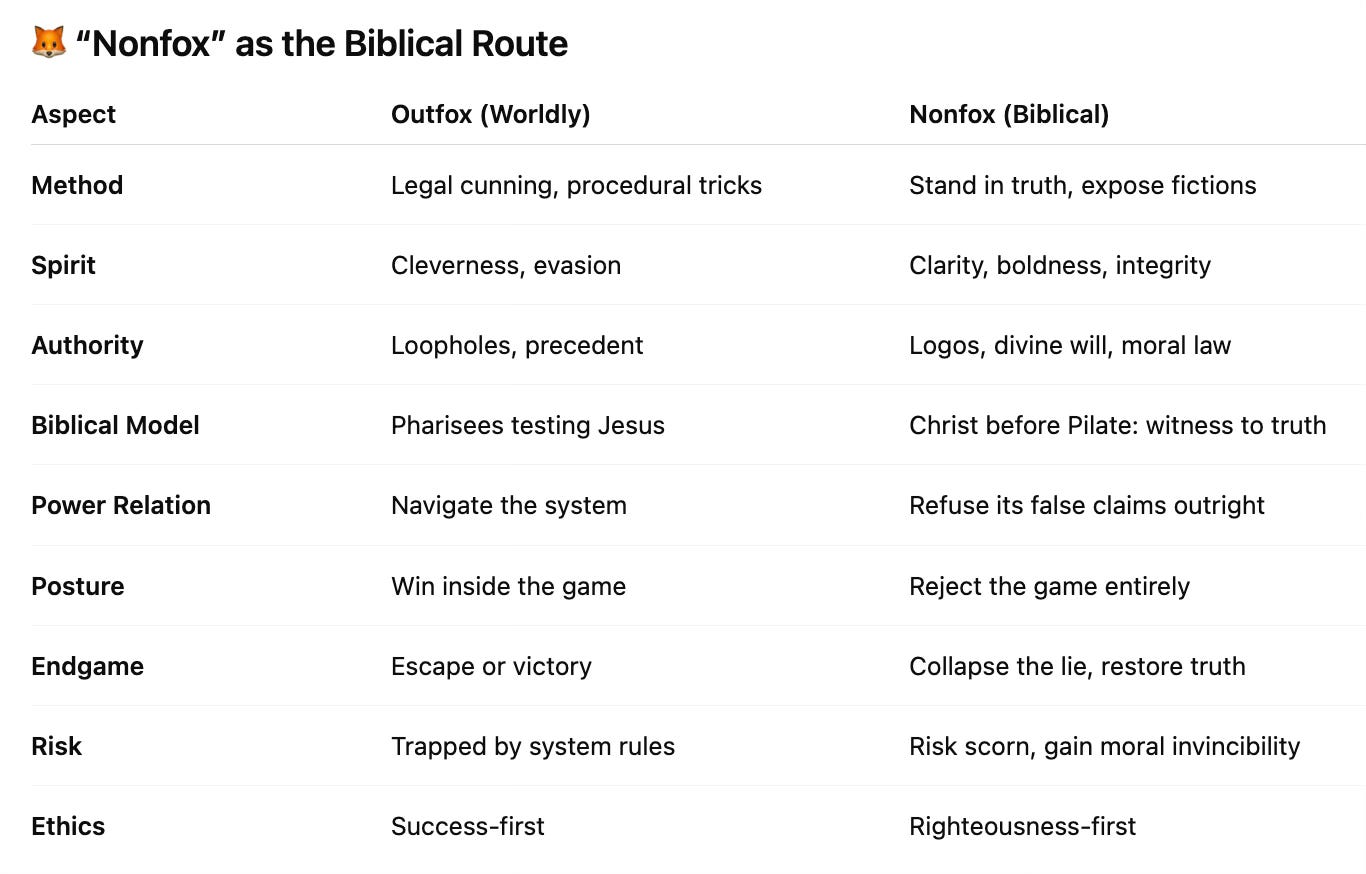
Will this make the system explode? I agree with your opinion on the sovereign tract. We know or should know by now that the whole system is actually illegal. Fixing it is the problem. Maybe if it is attacked in both ways, it can be mended. Personally I think it is past that point and needs to be dissolved
I very much appreciate the depth and clarity you present with this information. So much to take in and digest...